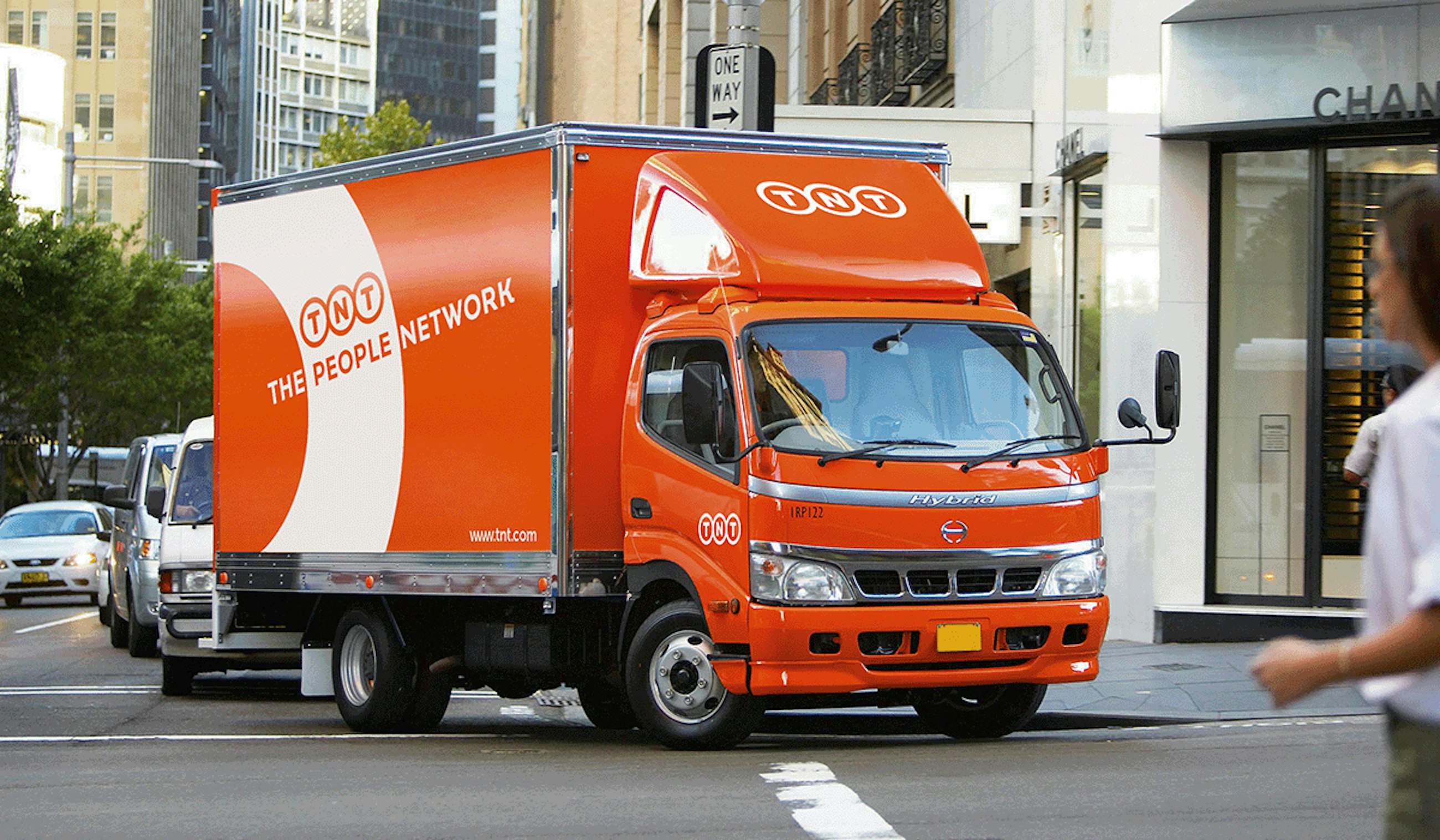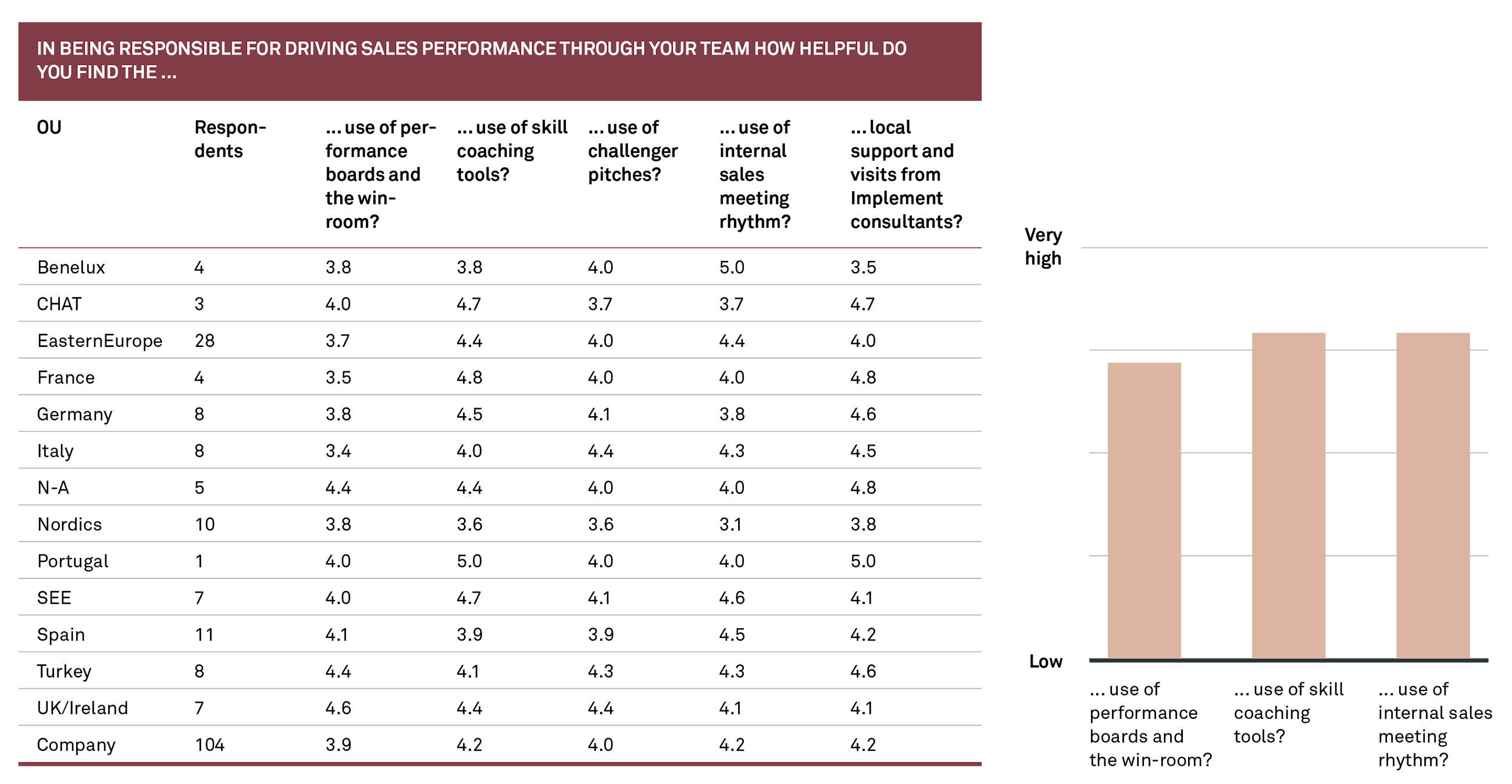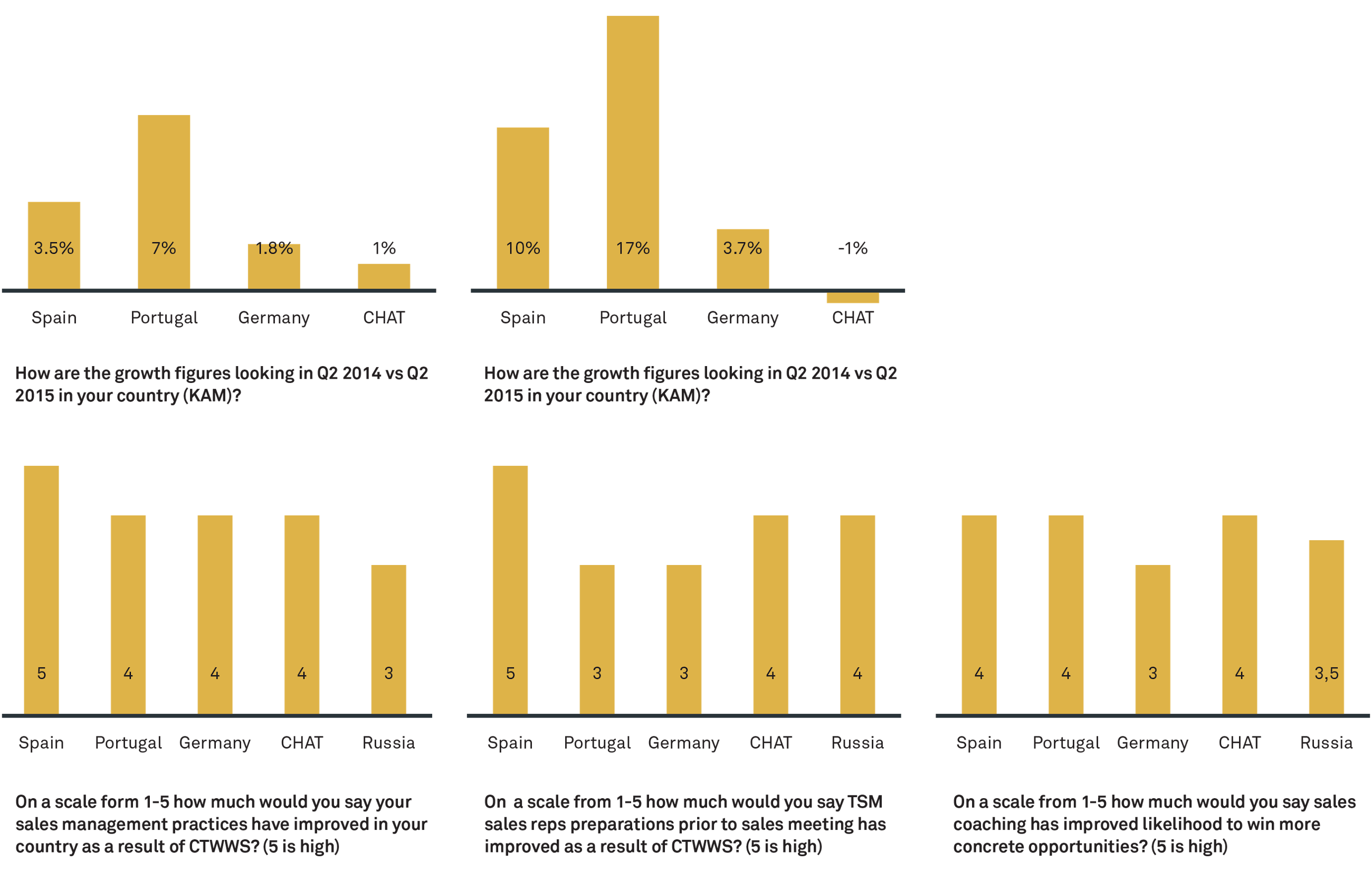Commenting on the challenges facing TNT’s sales organisation, Managing Director of the AMEA region, Jos Raaymakers remarks: "We needed to improve what we were selling and how we were selling it. But more importantly, we needed to fundamentally rethink the way we drove sales in order to win more business."
The sales manager as the driver of change
In June 2014, Implement began to “rethink” TNT’s approach to sales. As Christian explains: “TNT had been given six months to turn their top line around. We had to define the transformation that needed to take place in the sales organisation and make it happen. Fast.”
Research conducted by Implement’s partner, CEB – a best practice insights and technology company – shows that sales management is the most effective lever to pull when it comes to accelerating sales and creating revenue growth.2
“In the sales excellence projects, we have been involved in, the greatest impact on sales effectiveness has come by letting the sales managers drive change in their own teams,” says Christian. “They are the ones who need tools and training. Not in how to sell, but in how to coach, manage and motivate their teams.”
Implement presented these insights to TNT’s top management and got the go-ahead to design a customised sales acceleration programme for the global sales organisation. The Changing the way we sell programme was based on the interaction of three elements – cadence, coaching and the so-called “win rooms”.
Cadence
Regular team meetings with a set agenda are important in a sales acceleration framework, but are often neglected. They allow the sales manager to get a complete overview, discuss ongoing activities with the team and make sure that everyone is on the same page.
In TNT’s sales teams, meetings typically took place on an ad hoc basis with a semi-improvised agenda. The CTWWS programme introduced the concept of “cadence” – a regular rhythm of team meetings with agendas that all sales managers had to commit to.
“The fact that team meetings were fixed in the sales manager’s weekly schedule – and governed by an agenda – ensured regularity and focus in the team,” explains Christian. “Each manager was free to define their own rhythm of meetings and the specifics of the agenda. But everyone had to commit to minimum frequency and apply the general framework. Since this activity had been endorsed by top management, the managers found the time to do it.”
Coaching
Spending face time with sales reps is essential if performance is to increase in the team.
According to Christian, a sales manager has four key roles: “He or she is a performance manager – setting targets and checking that they are met; a sales mentor – providing advice and being a role model for the team; a change agent – translating the corporate strategy into action in the field; and a sales coach – asking relevant questions and guiding the sales reps to finding their own solutions to challenges. Out of these four roles, the latter is by far the most important when it comes to increasing the sales team’s performance.”
Changing the conversation
“Standard” sales management approach (reactive) | New coaching approach (proactive) |
What will you close this month? | How can we improve the balance? |
Did you reach your target? | How can we reach the target? |
Why did you lose? | How can we win? |
How did the meeting go? | How can we best use this experience? |
“You” focus | “We” focus |
A recent survey documents that sales goal attainment is 19 per cent higher among sales reps who have been coached compared to those who had not.3 Moreover, sales reps say that regular coaching is one of the reasons why they choose to stay with a company. Because they feel it supports them in their development.
In TNT’s case, coaching was also the key to changing the conversation between the sales manager and sales rep – from one of control and inspection to one of guidance and support.
Coaching is not an easy skill. In surveys, sales managers often rate themselves as good coaches. But when their reps are asked to rate their managers, the scores are often not as high.4 Typically , managers think they are coaching when they are in fact “telling” or “controlling”. In order to build their coaching skills, sales managers were trained in different types of coaching, and they were shown how to adapt their coaching to different personalities.
“Win rooms”
To stimulate more dialogue and create greater transparency in the sales teams, Implement added a third and final element to the CTWWS programme: the “win room” – a physical framework for constructive conversations about performance, pipelines and sales opportunities.
“As the name suggests, the win room is where you go to find out how to win in the market,” explains Christian. “It’s a physical space in the local sales organisation reserved for the sales manager and his team. This is where one-to-one coaching sessions take place, and where the whole team meets to share ideas, give each other feedback on challenges and agree on what action to take to create strong pipelines and win more business.”
And he continues: “The win room is a dynamic and creative space where the sales team comes together to motivate and inspire each other. The conversations going on there are proactive and forward-looking; they are about how we win more sales and create success – individually and as a team.”
To stimulate discussions and guide activities, the win room has three working walls equipped with different types of posters to guide discussions and ensure that the team covers key issues, tracks progress and makes decisions on next steps:
- The “pipeline wall” carries visual performance boards and working tools that track the progress and distribution of leads for the individual consultant and the team;
- The “must-win” wall has posters displaying prioritised must-win deals for each sales rep; and
- The “opportunity wall” carries visual tools to guide opportunity coaching.
“Visualising the activity in the sales team – as we do with the win-room concept – has a huge impact on team culture and performance,“ says Christian. “Everyone can see what’s going on, and problems can be quickly identified. To see your own performance on a poster may seem scary at first. But once people get used to it, they find it incredibly motivating. That’s because the conversation in a win room is open and constructive, with colleagues working together as a team and helping each other to perform better.”
Types of coaching
The CTTWS platform trained the sales managers in:
Pipeline coaching | Deal coaching |
Skills coaching |
Where the manager gets the sales rep to analyse his/her pipeline, assess its validity and determine whether or not it has enough volume. |
Where the conversation focuses on sales opportunities, singling out one deal in the pipeline and stimulating reflection on how to approach or progress it further. | Where the manager helps the sales rep build better sales skills and align his/her approach to TNT’s sales methodology. |
Making it work
The CTWWS programme was introduced through a three-phrase process: top management endorsement, sales manager mobilisation and effective local implementation.
To gain buy-in for the programme from senior management, TNT’s sales directors were invited to a series of sessions in June 2014, where the Implement consultant team worked with them to define the objectives of the programme and customise each of the three key elements to TNT.
In September 2014, 13 sales directors and 250 sales managers from 36 countries were invited to a grand-scale kick-off event in Ronda, Spain. The beautiful Andalusian surroundings set the scene for the CTWWS transformation. For three intense days, the sales managers worked together in national teams familiarising themselves with cadence, coaching and win rooms – the concepts that they would be implementing in their own teams.
“Ronda was all about winning hearts and minds,” Christian explains. “Creating a shared understanding among the sales managers of what CTWWS was all about, why it was necessary, and what it had to achieve.”
Moreover, the scale of the Ronda event and the way it was organised – with high intensity and high-involvement activities – made change very tangible. It sent a clear signal to the sales managers that this was not just another programme. Change had to happen, and they were the ones who had to own and drive it.
The sales managers responded to the challenge. As Ailsa Webb, former Global Sales Director recalls: “Ronda was a fantastic experience. This was the first time ever that TNT sales managers were gathered, and the passion and energy from everyone was amazing. Everywhere I looked, people were discussing what they’d learnt and what to do when they got home. And the level of ambition was really high. With all the changes that have been going on in TNT over the last years, it was impressive to see that people were really committed to take on a new way of working with sales.”
To sustain the momentum from the Ronda kick-off event – and to show that tomorrow would not be the same as yesterday – every sales team received a parcel from Implement on the following Monday morning with all the material they needed to set up their win rooms. The message was clear: It’s all there. You know what to do. Now go do it.
Win rooms were set up in more than 100 locations across Europe in the following weeks. Each team received two to three follow-up visits from the same Implement consultant that they had worked with in Ronda. During their visits, the consultants reviewed the change happening on the ground and offered to support the individual managers in tackling local challenges.
But it was the sales managers – not the consultants – who were in charge of implementation.



